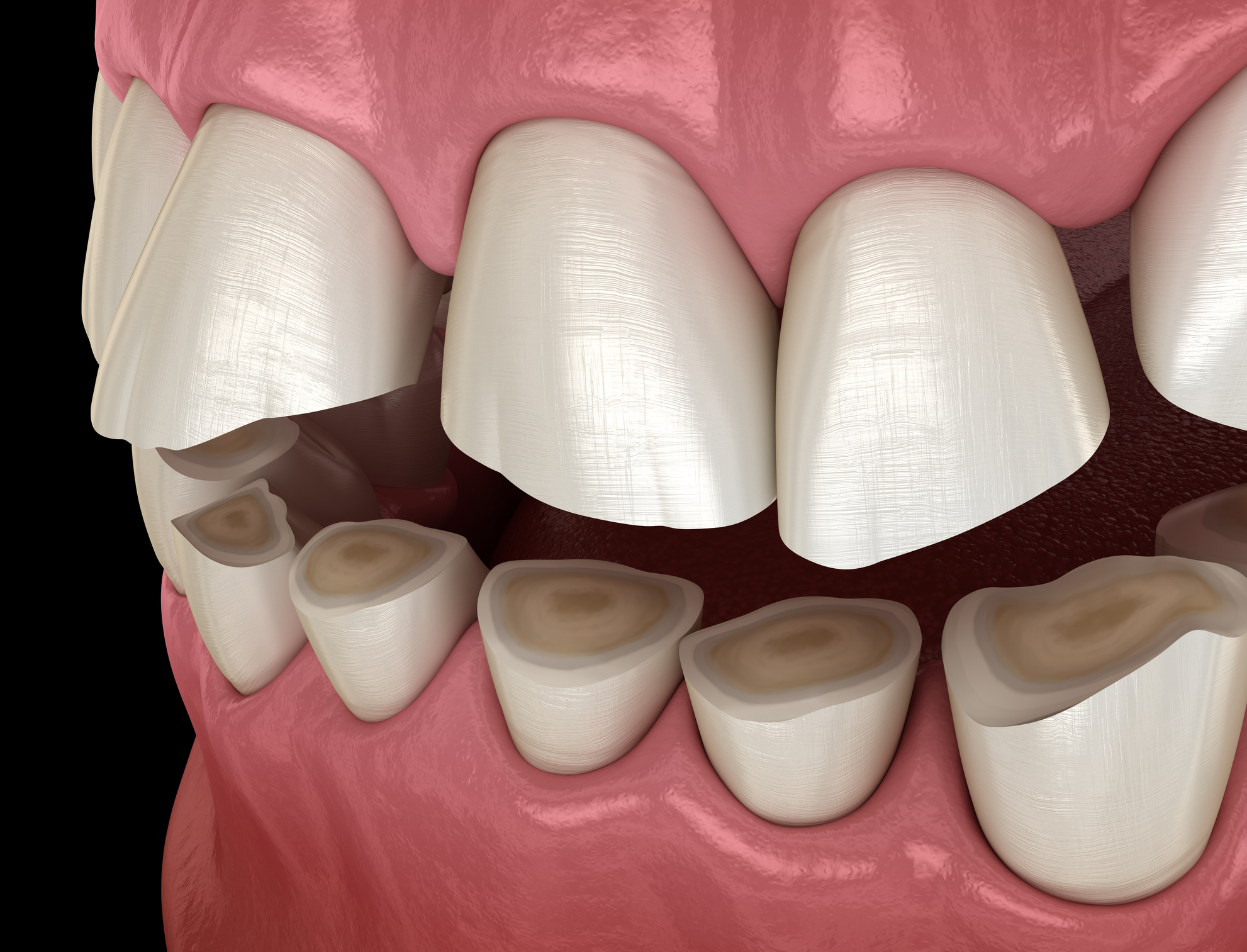-
The Dangers of Teeth Grinding and How to Prevent it

Effects of teeth grinding
Do you suffer from bruxism?
Do you grind your teeth? You might, without even knowing it. If you experience headaches, jaw pain, aching teeth, and throbbing temples, you may be grinding your teeth at night. Teeth grinding is a disorder known as bruxism, and it’s common, affecting as much as 30 percent of all people. Mild teeth grinding may not be a problem, but frequent or serious grinding can cause permanent mouth, jaw, or tooth damage if it’s not addressed. Here’s what you need to know.
The Dangers of Grinding Your Teeth
Tooth grinding can happen during waking or sleeping hours, and often, people don’t realize they’re doing it. Clenching your jaw without noticing or grinding and gnashing your teeth at night, though, can be damaging because the jaw can clamp down with 250 pounds of force. That much force can crack or break the teeth, as well as wearing down the enamel, and it can also cause chronic pain in the head, neck, and ears. Bruxism can lead to health problems like migraines, tinnitus, and sensitivity to noise, and some people even require a total joint replacement when the grinding gets so severe that it wears down the jaw cartilage.
Why Bruxism Happens
Sometimes, bruxism is a sign of stress. Clenching your muscles when you’re stressed, anxious, angry, or overwhelmed is a natural response, and if you are perpetually feeling those emotions, your clenched jaw can lead to nighttime tooth grinding. Certain medical conditions can lead to bruxism, like Huntington’s disease and Parkinson’s disease, and tooth grinding can also be the result of an existing sleep disorder. Sometimes, the medication you’re taking can cause you to grind your teeth. Antidepressants, antipsychotics, and amphetamines are all known causes of nighttime tooth grinding. If your teeth are misaligned, clenching and gnashing is even more likely to occur.
How do you know you’re doing it if you don’t know you’re doing it?
Your partner might be the first to notice, because bruxism can be noisy. Scraping, grinding, and clicking sounds can be loud enough to disrupt the sleep of a person sleeping in the same room as someone suffering from bruxism. Some people find they grind their teeth because of a dental visit. Grinding the teeth can wear them down, and sometimes the dentist is the first to notice. There are symptoms that you can catch, though, if you’re paying attention. Jaw pain and stiffness, tooth sensitivity, chipped or broken teeth, sore gums, clicking jaw joints, chronic headaches, earaches, or any evidence of excessive wear should prompt you to make an appointment with your dentist.
Preventing and Treating Bruxism
Your dentist is a powerful ally in the struggle with tooth grinding. Having a thorough dental exam can help you to determine the reasons you’re grinding your teeth, and your dentist can treat bruxism, sometimes with a measure as simple as a custom mouth guard you can wear while you’re sleeping. There are some steps you can take on your own, as well. Try employing stress reduction techniques, like deep breathing, mindfulness exercises, and yoga. Make sure your bedroom is your oasis, cool, dark, and quiet, with no TVs, computers, or phones. Try sleeping on your side or stomach, and work on daytime habits too, cutting back on caffeine and alcohol, avoiding chewing gum or biting on things that aren’t food, and establishing a relaxing bedtime routine. Physical therapy can help, especially through the use of massage, compresses, and mouth stretching exercises, and certain medications, like anti-inflammatory drugs or muscle relaxants, can be beneficial in treating bruxism.
Finding the Right Dentist
If you think your bruxism is causing issues, the first step towards fixing the problem is seeing a good dentist. If you’re looking for a dentist in New York, why not choose the dentist voted best in the city? At Park 56 Dental Group, we offer pediatric, prosthodontics, endodontics, oral surgery, Invisalign®, emergency, and sedation dentistry, all at the highest level of treatment. We serve the Midtown, Central Park, Upper East Side, Park Avenue, and all surrounding Manhattan and New York areas, with a patient-centered practice that has hours to fit your schedule. Schedule your complimentary consultation today by contacting us online or calling us at (212) 826-2322.
-
How to Protect Your Teeth When Playing Sports

Whether you’re a pro athlete or an avid weekend warrior, playing sports is fun and can be beneficial to your overall health. But it’s important to keep your teeth safe while playing too. There are a few simple measures that you can take to make sure your teeth stay healthy while you’re having fun on the field, court, or rink. Let’s take a look at why protecting your teeth is so important and how Park 56 Dental can help.
Why is it Important to Protect Your Teeth?
The primary reason for protecting your teeth when playing sports is to avoid dental injuries such as broken or chipped teeth, which can happen even if you wear the proper protective equipment. Injuries like these can not only cause pain but also lead to infection and require restorative dentistry treatments like crowns, bridges, or implants to restore functionality and aesthetics of the mouth. Additionally, athletes may suffer from temporomandibular joint (TMJ) problems or jaw fractures from taking hits in contact sports without adequate protection for their heads and mouths.
The Importance of Mouthguards
At Park 56 Dental we understand the importance of protecting yourself during physical activity. That’s why we offer customized athletic mouthguards that are specifically designed for each individual patient’s needs so they can play their sport safely and still perform well on the field. Our custom-made mouthguards provide superior protection compared to store-bought models because they are designed specifically for your mouth size and shape. We ensure that our mouthguards fit correctly and don’t hinder breathing or speaking during games or practices—so there’s no need to worry about missing out on any plays!
How Can I Protect My Teeth?
In addition to getting a custom-made athletic mouthguard from Park 56 Dental, there are other ways that you can protect your teeth when playing sports:
- Wear a helmet if applicable: Helmets are essential for contact sports like football, hockey, boxing, lacrosse, soccer etc., as they help protect both your head and face from serious injuries—including dental ones! Make sure you get one that fits properly; otherwise it won’t do much good in terms of protecting you from injury.
- Don’t chew gum or eat hard foods before playing: Chewing gum makes it harder for you to form a tight seal with an athletic mouthguard as well as distracts you from performing at peak levels on the field/court/rink. Eating hard foods could also damage braces or other dental appliances if worn during play time.
- Practice good oral hygiene: It’s always important to practice proper oral hygiene habits including brushing twice daily with fluoride toothpaste and flossing daily; however these habits become even more important when playing sports due to increased risk of dental injuries (as discussed earlier). Make sure you’re taking care of yourself by brushing and flossing regularly!
If you have any questions about how best to protect your teeth while playing sports—or would like more information about our custom-made athletic mouthguards—contact Park 56 Dental in New York today! We look forward helping keep your smile healthy and happy!
RECENT POSTS
categories
- Uncategorized
- Cosmetic Dentistry
- Veneers
- Healthier Teeth
- Teeth Whitening
- Dental Health
- Video
- Dental Emergencies
- Invisalign
- Dental Implants
- Root Canal
- Sedation Dentistry
- Infographic
- Dental Crowns and Bridges
- Dental Anxiety
- Gum Disease
- COVID-19
- Bad Breath
- New York Dentist
- Cut out sugar
- General Dentistry
- Oral Health
- Oral Cancer
- Dry Mouth
- Gum Health
- Toothache
- Dental Sealants
- Cavities
